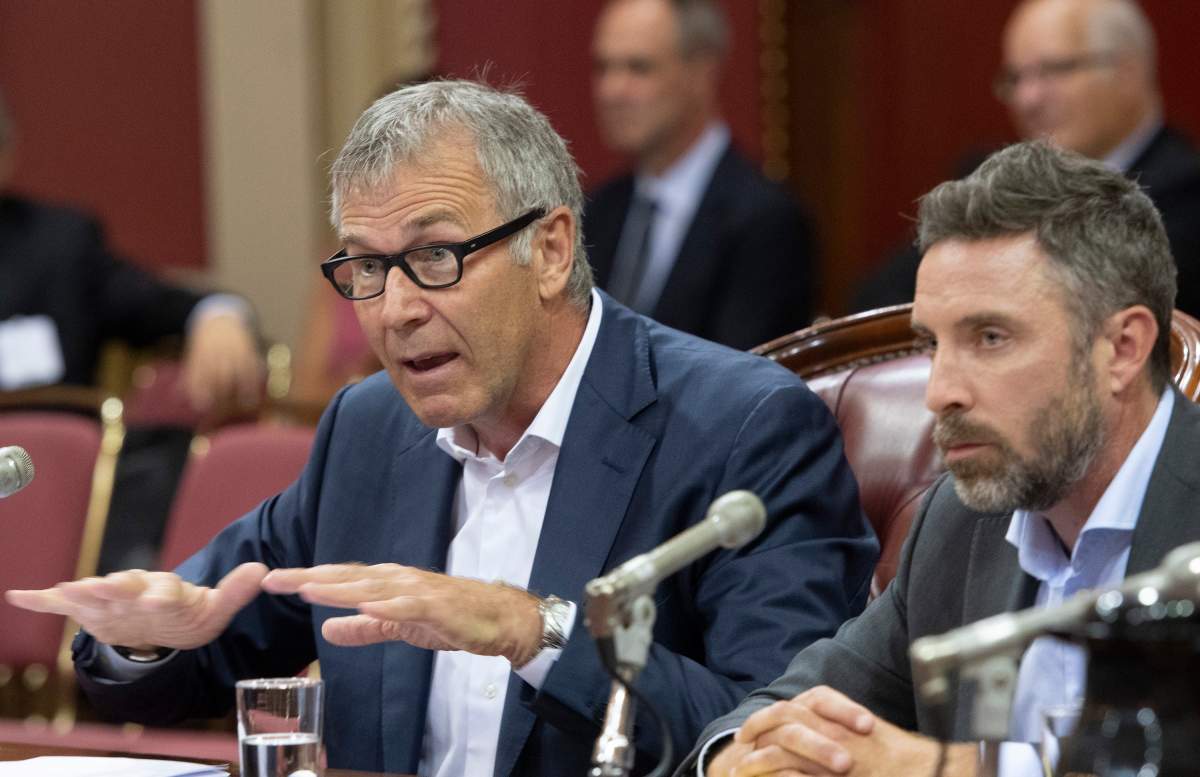Media representatives accustomed to shaping coverage of proceedings at Quebec’s national assembly have been thrust into a different role this week, appearing as witnesses before a legislature committee seeking ways to rescue a troubled industry.

One by one, they have told the committee studying the future of the media that government must act urgently to save the province’s news industry. They point out that traditional newsrooms across Quebec have shrunk due to steep declines in advertising dollars that have migrated to the internet.
Quebec had been planning legislative hearings on the media for months, but the committee’s work became particularly relevant this month when Groupe Capitale Medias, the owner of six daily newspapers in cities outside Montreal, sought and received court protection from creditors.
READ MORE: Hearings underway at National Assembly on future of news media in Quebec
In response, Quebec’s provincial investment arm lent the company $5 million to maintain activities until a buyer could be found.
The president of the struggling company, Claude Gagnon, told the committee Wednesday, the third day of hearings, that traditional news organizations in Quebec have a revenue problem.
“In the last 10 years we’ve lost 50 per cent of our revenues,” Gagnon said. “That’s enormous … and we all know where the revenues went.”
Over the past three days the committee heard numerous proposals to save Quebec’s news media. Politicians were asked to create a tax credit for certain journalism jobs or to collect public money in a fund dedicated to subsidizing media companies.
READ MORE: Quebec to come up with plan for failing newspapers
Politicians were also asked to reduce government spending on advertisements online — where most consumers can be found — and spend the money instead in traditional media outlets, such as newspapers.

Get breaking National news
And while the media representatives differed slightly on their remedies to save their industry, virtually all agreed the government needs to do something.
Politicians were told Quebec must either act alone, or put pressure on Ottawa, to tax the internet giants such as Google, Facebook, Amazon and Apple, and redistribute the money collected to local media companies that can’t compete with them in the open market.
Aside from journalists and media executives, mayors of some of the cities served by Groupe Capitale Medias’ daily newspapers also travelled to the legislature Wednesday and demanded the government tax companies such as Google.
“Assume your responsibilities and act!” Saguenay Mayor Josée Neron said, referring to the provincial and federal governments.
“Go and get the tax revenue where it is located.”
Liberal committee member Isabelle Melancon sang a similar tune. “I think we need to tax (the internet giants) as quickly as possible — do you agree?” she asked Andrew Mule, vice-president and general manager at Metro Media.
“Absolutely,” he replied.
Quebec Premier Francois Legault told reporters in Quebec City his government would like to tax the web companies but prefers to wait until a co-ordinated effort can be put together by G7 countries. He said Quebec will take Canada’s lead and wait until the G7 comes up with a plan, which he said should happen next year.
WATCH BELOW: Quebec holds hearings on future of news media

But Legault reminded journalists that taxing web giants will not solve what he called the “structural problems” facing the province’s news media. He proposed a different government-driven solution.
“What we need is to table a (bill) that will help financially sustain the newspapers across the regions,” he said.
A player that looms large in this debate is Quebecor Inc. and its president and CEO, Pierre Karl Péladeau. Radio-Canada reported earlier this month the Quebec government rejected an offer by Péladeau to snap up the six struggling dailies of Groupe Capitale Medias.
Péladeau stood out among the witnesses with his rejection of any potential state help for struggling news companies. Quebecor is a major player in the province, owning newspapers in the two biggest cities and one of the country’s main television networks and telecommunications companies.
READ MORE: Quebec to give $5M in emergency funding to newspaper chain
He said newspaper owners have known for years they needed to adapt to a changing news industry, and blamed their current problems on their “inertia” and “apathy.” The CEO mocked his competitors for thinking “their longevity depends on the goodwill of those who are at the command of the state.”
Péladeau was also among the few who told the committee that government money would put the perceived independence of media companies in question.
Earlier Wednesday, Brian Myles, head of Montreal newspaper Le Devoir, said government support would not compromise the media’s independence. He noted that Quebec’s literary, film and other cultural industries wouldn’t exist without taxpayer support and yet they offer “virulent” criticism of politicians and society.
He said the same would be true if the state supported the news media in a similar way. “The state is capable of keeping a distance,” he said.
The committee hearings on the future of the media run until Friday.







Comments
Want to discuss? Please read our Commenting Policy first.